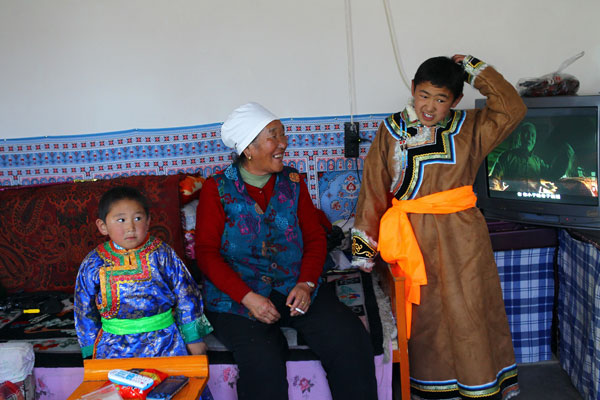An ancient land in change
Updated: 2013-01-21 08:51
By Cui Jia (China Daily)
|
||||||||
As promised, Bariba received his 27,000 yuan ($4,338) subsidy in 2012, but had to sell half his goats to protect the Gobi grassland from overgrazing. "It's something we had to do sooner or later. Mountain goats eat the roots of the grass, and too many of them will destroy the grassland forever."
To scare away wolves at night, Bariba ties empty liquor bottles to the wires surrounding the goat pen in the hope that the sound of the bottles bouncing against each other will spook the predators.
"It used to work, but the wolves are getting smarter and aren't scared of the bottles anymore. Two wolves jumped into the pen one night last year and killed more than 10 goats," he said. More than 3,000 head of livestock, including mountain goats and camels, were killed by wolves in Mazongshan in 2012.
Herdsmen don't have guns to shoot the wolves anymore, because all the firearms have been confiscated by the local authorities, but the fences erected across the Gobi to indicate the prohibited-grazing area have trapped the wolves in the desert, said Bariba. "One of my friends lost more than 100 goats in a single night. We haven't seen this many wolves for a long time. It seems like they reappeared all of a sudden."
Threat from mining
Not everyone shares Bariba's view of the danger posed by predators. "Last year, the local government sent people to shoot the wolves, but they couldn't find any," said Malan Qiqige, resplendent in a traditional Mongolian gown. The 47-year-old's family owns more than 700 goats, 12 camels and 20 horses.
She said the pollution caused by heavy mining in the area is far more damaging than wolf attacks. "The grass dies once it's been covered by the ore that falls from the trucks. Also, the livestock are at risk. They can easily die after consuming toxic waste such as plastic bags."
Bariba said there has been a huge increase in mining since 1998 and said that one mine in particular has left an impression on the herdsmen, but not a favorable one. He's referring to the Tulu opencast mine, which began operations in 2003 and has left a scar on the Gobi more than 7 km long.
 |
|
Bayishi Hule's family - his mother and two siblings. Photos by Zou Hong / China Daily |

 Li Na on Time cover, makes influential 100 list
Li Na on Time cover, makes influential 100 list
 FBI releases photos of 2 Boston bombings suspects
FBI releases photos of 2 Boston bombings suspects
 World's wackiest hairstyles
World's wackiest hairstyles
 Sandstorms strike Northwest China
Sandstorms strike Northwest China
 Never-seen photos of Madonna on display
Never-seen photos of Madonna on display
 H7N9 outbreak linked to waterfowl migration
H7N9 outbreak linked to waterfowl migration
 Dozens feared dead in Texas plant blast
Dozens feared dead in Texas plant blast
 Venezuelan court rules out manual votes counting
Venezuelan court rules out manual votes counting
Most Viewed
Editor's Picks

|

|

|

|

|

|
Today's Top News
Boston bombing suspect reported cornered on boat
7.0-magnitude quake hits Sichuan
Cross-talk artist helps to spread the word
'Green' awareness levels drop in Beijing
Palace Museum spruces up
First couple on Time's list of most influential
H7N9 flu transmission studied
Trading channels 'need to broaden'
US Weekly

|

|








